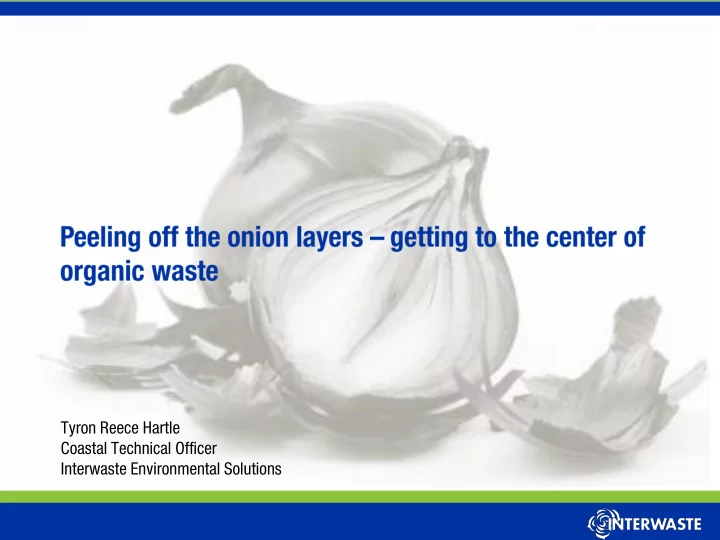

Tyron Reece Hartle Coastal Technical Officer Interwaste Environmental Solutions
Global waste trends and impact on SA industry Source: SA Department of Science and Technology, 2014
57% % of MSW in sub-Saharan Africa is Organic waste Generation of 125 millio ion tonnes es per annum (2012) set to double by 2025 90% % of waste disposed of at uncontrolled dumpsites and landfills. 19 19 of the world’s 50 biggest dumpsites are located in Africa An estimated 70 70-80% 80% of MSW generated is recyclable, yet only 4% is currently recycled There’s work to do! Source: Africa Waste Management Outlook by UN Environment and CSIR
Organic waste handled by Interwaste currently comes from Industrial and Commercial Clients These range from manufacturing and processing facilities to logistics and distribution centers The waste usually comes in 3 categories Production Pure Organics – organics coming from manufacturing or production lines Packaged Organics – organics in packaging rendered as waste due to contamination, expiry, damage or trade returns Kitchen / Food Waste – organics coming from kitchens in offices, lunch areas and cafeterias of clients
Landfill is the least desirable option in terms of final destination There are challenges around changing perceptions of waste generators to look at alternative to landfill solutions Barriers to these alternatives include contamination, logistics and processing technologies available Diversion is possible though and the target of 50% diversion by 2022 can be achieved by overcoming these barriers
The aim is to adhere to the waste hierarchy Focus on reduction first – assist clients in looking at processes generating waste and look at decreasing the volumes of waste produced Re-use is the second most favourable option. There are projects whereby expired or trade returned items are resold at reduced prices to lower income communities but there are food security and product security issues, hence our clients do not favour these options Recycle or Compost is third on the waste hierarchy and there are a number of composting facilities available for organic waste Fourth on the list would be recovery or waste to energy. There are several facilities that recover the organics and use them as a raw material to make alternative products of higher value
Contamination of organics is not limited to the organics being soiled by unsavory chemicals or products Contamination is defined differently depending on the facility the organics are destined for Therefore, it is imperative to handle the organics in a way that has the end destination in mind
On-Site separation and sorting is the most efficient way to maximise the value of your waste!
There are a variety of solution out there for organic waste The key is to match the right stream with the right solution All solutions have their own unique Pro’s and Con’s and an all inclusive solution isn’t always possible The aim is to find the best solution environmentally and economically Ensuring the solution is a sustainable one however does also take work from the waste generator and working together is the only way to ensure a successful solution
Images and text provided by AgriProtein
Image provided by AgriProtein Situated in Philippi Can only take pure organics (packaged solutions being finalised) Can receive organics in skips
AD breaks down organics using heat and natural organisms to produce biogas and fertiliser This gas is then used to generate electricity and heat or used in industry It is a safe and environmentally responsible way to dispose of organic waste and also create higher value products out of organic waste
Situated in Athlone Can take pure organics and organics in packaging Can receive organics in skips, tanks or flowbins
Images provided by ZTL Organics Situated in Philippi Can only take pure organics We Compos ost t all k kinds of organi nic wa waste: Can receive organics in skips Food d wa waste te including ng dairy pro roduc ucts ts, , meat, , fruit t and vegeta tabl ble peels, , te tea bags, , coffee gro rounds nds, , plate te scrapi pings gs Garden n wa waste te, , paper r wa waste te and Grease Trap Fat wa waste
Pro’s: Landfill diversion Generate useful products out of waste Disposal is often cheaper per ton Con’s: Organics need to be de-packaged (depending on solution) Any contamination can cause issues to the facility Transport can be more expensive depending on location and the facility's infrastructure
Sending organic waste to landfill is the least desirable option in terms of final destination There are challenges around changing perceptions of waste generators to look at alternative to landfill solutions There are barriers to these alternatives Working together, using knowledge and experience plus sourcing the best solution that is stream specific is the only way to deal with the problem Diversion is possible and the target of 50% diversion by 2022 can be achieved
Any questions?
Recommend
More recommend